
Jefferson Airplane was an American rock band formed in San Francisco, California, in 1965. One of the pioneering bands of psychedelic rock, the group defined the San Francisco Sound and was the first from the Bay Area to achieve international commercial success. They headlined the Monterey Pop Festival (1967), Woodstock (1969), Altamont Free Concert (1969), and the first Isle of Wight Festival (1968) in England. Their 1967 breakout album Surrealistic Pillow was one of the most significant recordings of the Summer of Love. Two songs from that album, "Somebody to Love" and "White Rabbit", are among Rolling Stone's "500 Greatest Songs of All Time".
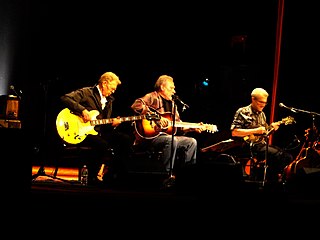
Hot Tuna is an American blues rock band formed in 1969 by former Jefferson Airplane members Jorma Kaukonen (guitarist/vocals) and Jack Casady (bassist). Although it has always been a fluid aggregation, with musicians coming and going over the years, the band's center has always been Kaukonen and Casady's ongoing collaboration.

Surrealistic Pillow is the second studio album by the American rock band Jefferson Airplane, released on February 1, 1967, by RCA Victor. It is the first album by the band with vocalist Grace Slick and drummer Spencer Dryden. The album peaked at number three on the Billboard 200 and has been certified platinum by the Recording Industry Association of America (RIAA). It is considered to be one of the most influential and quintessential works of the early psychedelic rock era and 1960s counterculture.

John William Casady is an American bass guitarist, best known as a member of Jefferson Airplane and Hot Tuna. Jefferson Airplane became the first successful exponent of the San Francisco Sound. Singles including "Somebody to Love" and "White Rabbit" charted in 1967 and 1968. Casady, along with the other members of Jefferson Airplane, was inducted into the Rock and Roll Hall of Fame in 1996.
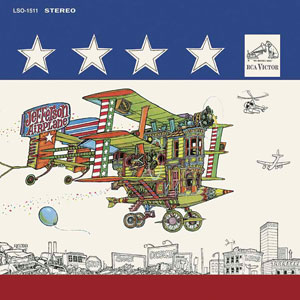
After Bathing at Baxter's is the third studio album by the San Francisco psychedelic rock band Jefferson Airplane, released in 1967 as RCA Victor LSO-1511 (stereo) and LOP-1511 (mono). The cover art was created by artist Ron Cobb.
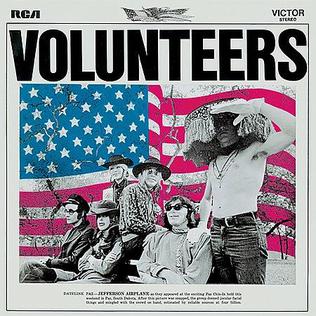
Volunteers is the fifth studio album by American psychedelic rock band Jefferson Airplane, released in 1969 on RCA Records. The album was controversial because of its revolutionary and anti-war lyrics, along with the use of profanity.

Crown of Creation is the fourth studio album by the San Francisco psychedelic rock band Jefferson Airplane, released by RCA Victor in August 1968. The album saw the band continuing their development of psychedelic music, emphasizing acid rock with science fiction themes.

Thirty Seconds Over Winterland is an album by the American psychedelic rock band Jefferson Airplane. It was recorded live in August and September 1972, at the Auditorium Theatre in Chicago and the Winterland Ballroom in San Francisco. It was released in April 1973; reflecting the band's declining commercial stature, it only peaked at No. 52 on the Billboard chart.

Bark is the sixth studio album by American rock band Jefferson Airplane. Released in 1971 as Grunt FTR-1001, the album is one of the Airplane's late-period works, notable for the group's first personnel changes since 1966. The album was the first without band founder Marty Balin and the first with violinist Papa John Creach. Drummer Spencer Dryden had been replaced by Joey Covington in early 1970 after a lengthy transitional period in which both musicians had performed with the band.

Long John Silver is the seventh studio album by the American rock band Jefferson Airplane, and their last album of all new material until 1989. It was recorded and released in 1972 as Grunt FTR-1007.

Jefferson Airplane is the eighth and final studio album by San Francisco rock band Jefferson Airplane, released on Epic Records in 1989. Marty Balin, Paul Kantner, Grace Slick, Jorma Kaukonen and Jack Casady all returned for the album and supporting tour, though Spencer Dryden did not participate. The album and accompanying tour would mark the last time Jefferson Airplane would perform together until their 1996 induction to the Rock and Roll Hall of Fame.

The Worst of Jefferson Airplane is the first compilation album from the rock band Jefferson Airplane, released in November 1970 as RCA Victor LSP-4459. The "Worst" in the title is ironic, as the album features all of Jefferson Airplane's hit singles up to that point. It peaked at #12 on the Billboard 200 in 1971 and has since gone platinum.
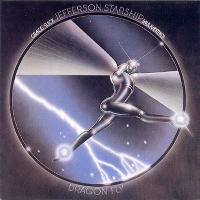
Dragon Fly is the debut album by Jefferson Starship, released on Grunt Records in 1974. It peaked at No. 11 on the Billboard 200, and has been certified a gold album. Credited to Grace Slick, Paul Kantner, and Jefferson Starship, the band itself was a turning point after a series of four albums centering on the partnership of Kantner and Slick during the disintegration of Jefferson Airplane through the early 1970s.
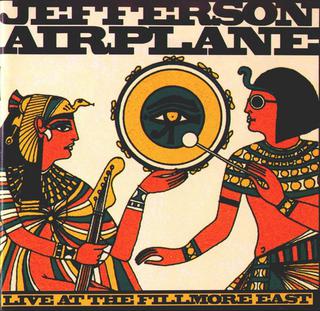
Live at the Fillmore East is an album by the rock band Jefferson Airplane. It was recorded on May 3 and 4, 1968, at the Fillmore East in New York City. It was released on April 28, 1998. It is not to be confused with the similarly named Jefferson Airplane album Sweeping Up the Spotlight: Live at the Fillmore East 1969.

Hot Tuna is the debut album by the American blues rock band Hot Tuna, released in 1970 as RCA Victor LSP-4353. It was recorded live at the New Orleans House in Berkeley, California in September 1969. It peaked at #30 on the Billboard 200 album chart.
"Today" is a folk rock ballad written by Marty Balin and Paul Kantner from the band Jefferson Airplane. It first appeared on their album Surrealistic Pillow with a live version later appearing on the expanded rerelease of Bless Its Pointed Little Head. Marty Balin said, "I wrote it to try to meet Tony Bennett. He was recording in the next studio. I admired him, so I thought I'd write him a song. I never got to meet him, but the Airplane ended up doing it." Jerry Garcia plays the simple, repetitive but poignant lead guitar riff on the song.

"Mexico" is a single released in May 1970 by San Francisco rock band Jefferson Airplane, produced by the band at Pacific High Recording Studios with Phill Sawyer as the recording engineer. Written and sung by Grace Slick, it is a tuneful rant against then-President Richard Nixon and his anti-drug initiative, Operation Intercept, that he had implemented to curtail the flow of marijuana into the United States from Mexico. The song closes with an exhortation for the young to realize the power of their numbers, as shown by the gathering of "half a million people on the lawn" at Woodstock.

Jefferson Airplane Loves You is a three-CD boxed set of recordings by the San Francisco rock band Jefferson Airplane with extensive liner notes by Jeff Tamarkin, author of the Jefferson Airplane history Got a Revolution: The Turbulent Flight of Jefferson Airplane.
Peter Kaukonen is an American guitarist, multi-instrumentalist and songwriter based in the San Francisco Bay Area. He is the younger brother of Jorma Kaukonen from Jefferson Airplane and Hot Tuna. Peter Kaukonen has played, toured, and recorded with Jefferson Airplane, Jefferson Starship, Hot Tuna, Johnny Winter, Link Wray, Terry Allen, Ruthann Friedman, as well as his own band, Black Kangaroo.

Steady as She Goes is a 2011 album by Hot Tuna, the band's first studio album since 1990. After Jorma Kaukonen recorded his solo album in 2009 at Levon Helm's studio in NY, he asked his new record company Red House if they would be interested in a Tuna album. The band started recording new tracks in November 2010 with the same producer and studio that Kaukonen used for River of Time and features the latest lineup of the band that formed in 2009 when Skoota Warner joined on drums. On March 11, 2011, Red House released "Angel of Darkness" as a free single. The album was released on CD and on iTunes April 5, 2011 and was released on vinyl in May. The album first charted on the Tastemaker and Independent album lists compiled by Billboard for the week of April 23.

















